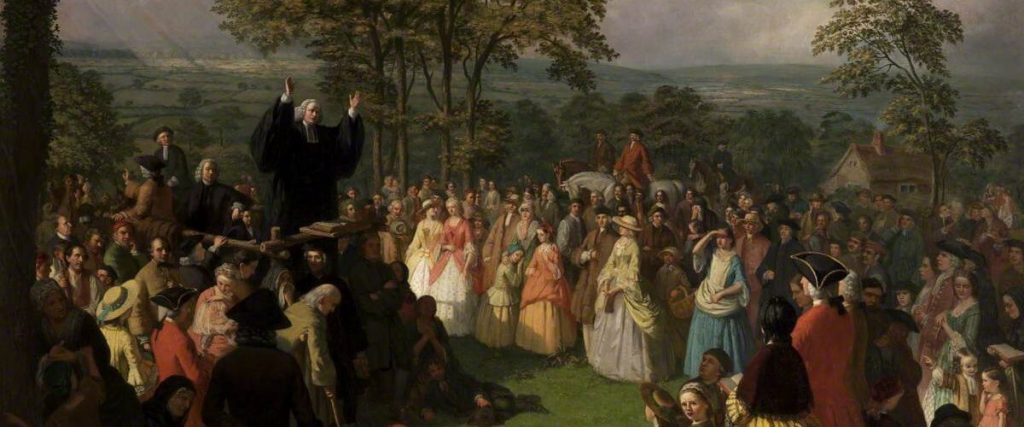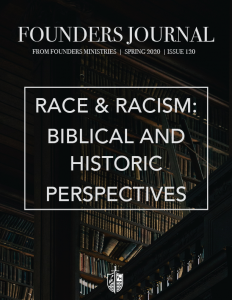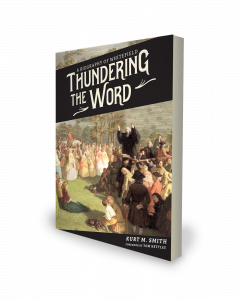Kurt Smith
Thundering the Word: The Awakening Ministry of George Whitefield.
Greenbrier, AR: Free Grace Press, 2020.
If you have not read a biography of Whitefield, this is the first one you should read. It is energetic, spiritual, appreciative, honest, and accessible. You will grasp the life of Whitefield, sense his passion, feel his energy, learn his doctrine, appreciate his preaching, sympathize with his disappointments, and embrace his relevance. Also, you will learn, from the way the footnotes supplement the text, what books you should read to expand your acquaintance with any aspect of Whitefield’s life and thought.
If you have read many books on Whitefield, this is the one you should read next. Though overall one finds the scope succinct, the parts on which the author makes expansion are treated from a perspective seldom seen in Whitefieldian genre. Detailed attention to pivotal issues in Whitefield’s life from a stance of pastoral theology intensify the charm and the usefulness of this volume.
One way to read this book would be to read the text straight through without being distracted into the footnotes. You will find the narrative coherent and satisfying. Then go back and read the footnotes by themselves. This will punctuate your understanding with provocative reflections from Whitefield himself, other biographers of Whitefield, and a variety of Whitefield’s contemporaries. Of course, just a page by page reading that includes both text and footnotes will be an enriching experience. That is the way I read it.
As mentioned above, this biography of Whitefield may serve also as a manual of pastoral theology. Kurt Smith is a pastor who loves history, particularly biographies of faithful and useful Christians, that he might glean and share with others insights for God-honoring ministry. As one reads this book, he can trust that accuracy of judgment and careful evaluation of sources is built into every discussion. Kurt has consulted an enormous number of secondary sources and has employed them for careful, succinct, accurate interaction with the research of others. Engaging the footnotes, the reader will find that Smith’s knowledge of the “state of the question” concerning Whitefield research is thorough. Those who love Whitefield, who celebrate Whitefield, who give close but fair scrutiny to Whitefield, and those who are jaundiced in their view of Whitefield have received a close read from Kurt. He corrects the misreadings of some cynical historiographers along the way.
In addition, His consultation with primary sources is truly impressive. The sermonic literature, Whitefield’s diary, his letters, the words of contemporary critics, friends, converts, and other observers of Whitefield’s ministry are engaged generously throughout the book. This combination of secondary and primary sources is not pressed together in a haphazard manner but with pleasing attention to context and accurate integration of subject matter.
I mentioned the value of this work for pastoral theology. Smith spends an impressive amount of critical thinking on pastoral issues that naturally emerge in Whitefield’s ministry. One obvious area is the relation of Whitefield’s unfaltering belief in and presentation of the leading doctrines of Calvinism with his fervent evangelism. Smith gives an excellent summary of the vital connection between the sovereign decree of salvation of the elect and the necessity of the use of means for its perfect accomplishment. Along with this is not only the cerebral pleasure of seeing the connection, but the passion for the glory of God and the salvation of sinners that floods the mind and heart of the grand itinerant. Whitefield was fearful of the kind of Calvinism that had been learned only in the university and not absorbed in the heart.
Another point of pastoral theology is the manner in which one should carry on controversy. Smith points to the humble approach that Whitefield took in his letter to Wesley after Wesley had taken a strong public stance against the doctrines of grace. Whitefield answered the content objections that Wesley had but also modeled a self-effacing humility in doing so. Looking at Whitefield’s demeanor in controversy, Smith isolated the assumptions that were productive of his humility, He knew that the decree of salvation and the gift of saving faith were given irrespective of his own unworthiness. They were sovereign bestowals that emphasized, not any degree of merit, but absolute dependence. He remained aware of how indwelling sin affected his life every day. His confidence in the truth grew alongside increased dependence of the person and work of Christ. Whitefield maintained a teachable spirit and was never at ease with the dimensions of his own spiritual growth. Whitefield examined his own conduct in controversy and criticized his own judgmental spirit in declaring, with regrettable self-confidence and censoriousness, the unregenerate status of some ministers.
Smith takes a close look also at Whitefield as a preacher, focusing on the richness and Christ-centered nature of his content and the sincere exuberance of his style. Smith distilled six informative points from observing Whitefield’s sermons and illustrates each of these points with a rich body of primary source material. Whitefield was aggressive. Every sinner in the vast audience knew that he was going for them. He was compassionate, exuding love and sorrow for lost sinners. He used an interrogative method of evangelistic assault, forcing his hearers to engage the content of the sermon by answering vital questions. A fourth trait was the doctrinal content of his sermons. He was God’s messenger and salvation could come only in accord with the truth. Next, his preaching was authoritative. He preached God’s word, not his opinions. He issued absolutes and ultimatums for he spoke the message of divine revelation, not human surmise. Finally, (and all is vain without this element) his preaching was anointed. The Spirit of God gave palpable indications that he owned the preaching of Whitefield, that Whitefield’s mission was divinely given and divinely blessed. Each of these points is fleshed out with anecdotal richness through consultation with a cloud of witnesses.
We also learn from Smith’s sensitive account of Whitefield that opposition to energetic, zealous, and faithful service can be expected and in some cases might not be diminished. Popular uprisings against Whitefield as well as ecclesiastical harassment from some ministers was a regular occurrence. In the midst of those storms, however, Whitefield saw blessings on his ministry and sensed genuine effusions of the Holy Spirit that made the opposition seem as mere flea bites.
The reader also will find a tender and honest treatment of two areas where Whitefield has been faulted by the generations following. Whitefield’s marriage to Elizabeth that placed no curb on his constant travel and long absences, often at sensitive times, is examined with historiographical integrity and emotional patience. Also, Smith gives a candid view of Whitefield’s ownership of African slaves. These chapters will round out the humanity of Whitefield with a pertinent analysis of the way Whitefield’s conduct related to Scripture and to life-situation.
Several appendices complete the book and illustrate some of the important discussions that Smith pursues in the text.
I commend this work with gusto. This commendation comes from an expectation that each reader will find that the time and energy given to this pleasure will be multiplied in serious meditations on personal holiness and faithful discipleship.






















